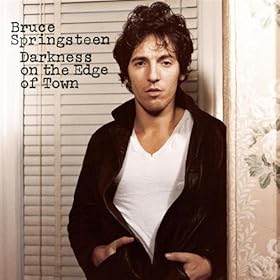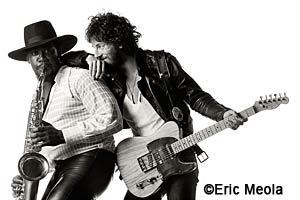 Granted, this lad was happily entrenched in his two chosen genres at the time: blues rock and cosmic cowboy. But off to the side, one couldn't help notice the buzz that was building for this mysterious fellow from Jersey with that funny name. Being in the northeast, it was not uncommon to run across old school pals that were singing his praises after their having witnessed a live show. In the Capital Region, one such gig took place at Union College; an event that has taken on mythical proportions locally in the ensuing decades. (Note: a bootleg recording of this show is readily available).
Granted, this lad was happily entrenched in his two chosen genres at the time: blues rock and cosmic cowboy. But off to the side, one couldn't help notice the buzz that was building for this mysterious fellow from Jersey with that funny name. Being in the northeast, it was not uncommon to run across old school pals that were singing his praises after their having witnessed a live show. In the Capital Region, one such gig took place at Union College; an event that has taken on mythical proportions locally in the ensuing decades. (Note: a bootleg recording of this show is readily available).Then, of course, the hype monster kicked in come Born to Run. This turned me off even more, as did the heavily played title track: more of that annoying keyboard work, compressed production and poet laureate wannabe songwriting. No thanks, I said.
But a funny thing happened on the way to the forum. The mass success of the third album made it impossible to tune into a progressive FM station or pay a social visit without hearing its deeper cuts, most of which weren't so bad after all. Yes, the main tune was still annoying as hell (especially after the 1,000th listen), but the other tracks here and on the prior Greetings from Asbury Park and the Wild, the Innocent and the E Street Shuffle surprised with their appeal. Again: back then, the album is what mattered.
Darkness on the Edge of Town delivered the knockout punch and I was fully on board. Game, set, match.
 So I was late to the party; shoot me if you must. The need to see a confirming live show was next on the agenda, and that mission was soon accomplished. We needn't repeat the superlatives on that experience here, for that is an exercise that has been exhausted to the max by many predecessors here and elsewhere -- and all of it is basically correct.
So I was late to the party; shoot me if you must. The need to see a confirming live show was next on the agenda, and that mission was soon accomplished. We needn't repeat the superlatives on that experience here, for that is an exercise that has been exhausted to the max by many predecessors here and elsewhere -- and all of it is basically correct.The E Street Band was, in fact, a guitar band, albeit with dual keys adding scope and heroic songs delivered in heroic fashion. Then there was that Big Man standing off to the audience's left.
Clarence Clemons will never be considered a world class saxophonist by any means and the consensus is that Springsteen charted all of his work. But neither of those points should be fodder when discussing his legacy. His having delivered his chosen instrument and his own musical legacy to the rock audience is what counts.
At the heart of the rock era of 1970, the sax was rarely on the radar screen. The heads looked at it as a squaresville relic of the 50's and 60's shit their parents might have grooved on at the suburban cocktail hour: Yakkety yak, don't talk back. Sure, it would pop up nicely in some spaced-out Traffic stuff and the like, but it was relegated by that generation to the history books -- to either Lawrence Welk or those weird jazz guys in the shades.
 Clemons, being older than his future band mates, came from that history. He was part of the last pedigree line of the black, Midwest, juke joint R&B acts; they of the bouncy tunes, shiny coats, skinny ties and buckled shoes. King Curtis was his hero. But come the late 60's, work for those kind of cats became hard to find.
Clemons, being older than his future band mates, came from that history. He was part of the last pedigree line of the black, Midwest, juke joint R&B acts; they of the bouncy tunes, shiny coats, skinny ties and buckled shoes. King Curtis was his hero. But come the late 60's, work for those kind of cats became hard to find.The Philly / Jersey scene became a sort of last refuge (at least on the east coast) for that genre, mainly because that region was a half-beat behind the rest of the country, musically. This was likely a result of its being heavily vested in the older doo-wop and Jersey Boys stylings. The Shore continued to supply venues and audiences to guys like Clemons after other 'burghs had shown them the dance hall exits.
But by 1972, the loud and hairy inland freaks like Springsteen were muscling in and the writing was on the wall. Unlike his contemporaries, though, Clemons didn't possess a natural aversion to the heavies and his impromptu sitting in session on that stormy night with this headstrong guy called the Boss by his sidemen became the long-running gig that brought his King Curtis yaks to the rock masses.
As the E Street Band finalized its personnel and learned to play together, its shows became that near-religious revival experience for which they are tagged. Preacher Bruce delivered the sermon, relaying the hopes & dreams and trials & tribulations of working and middle class life to the affected gathering. The two and later three-way guitar attacks (Bruce, Steve and Nils) would simultaneously be both beautiful and scary, and that they should because it represented the work of the devil, best expressed through his obvious weapon, the sex & drugs laden electric guitar.
But to the rescue, each and every night, was Clarence Clemons with his sword of virtue, that symbol of the more innocent times, the old time saxophone. When he soloed with those majestic wails, the guitars faded into the background as if cowering in defeat to a hiding place behind the amplifier stacks. There was a reason the sax solos usually happened after the axe solos: the good needed to prevail over the evil in Mr Springsteen's sanctuary.
Now who else could deliver that good but a giant, trusted ally stationed as his right-hand man? There lie Mr Clemons.
Bruce Spingsteen and the E Street Band's key role in rock music should not be minimized. Recall the time in which they emerged: a competent enough musician from a noisy British band has just released a good times live album recorded in front of a bunch of party animals at Plattsurgh State College called Frampton Comes Alive. Through no fault of that particular gentleman, what soon emerged was the bombastic era of Arena Rock, with glorified bar bands like Kansas, Boston, Seeger and REO Speedwagon paying in football stadiums and dominating radio. Into the void would come disco and rock & roll appeared destined for the nostalgia lounges.

Punk is credited as the savior, having risen from those ashes in the early 80's. But the E Street Band had always been there throughout that darkness--and it was still there at the end. As they became the biggest American band in history, the E Street Band swept along with it a 20-year demographic segment that until this week would still be willing to go to a Bruce revival meeting and who collectively shakes its head in despair when watching its own children and grandchildren bopping to this new plague called hip hop.
Music, like literature, is great because one can reach across generations to be touched by the spirit of those long gone and those we've never known. So it is today with the loss of Clarence Clemons.
 So yes; crank up those E Street masterpieces with which we are now so familiar and relive the pure joy of what that rock and roll band did -- and always can do -- for our own individual, current day spirits.
So yes; crank up those E Street masterpieces with which we are now so familiar and relive the pure joy of what that rock and roll band did -- and always can do -- for our own individual, current day spirits.As for myself, I think I will call up some King Curtis on the old Rhapsody service, for the very same reason.
R Millis
10 comments:
plague!
i love it
and so true
xcellent
nice post.
Well done. I'm glad you put up the img of Darkness. I didn't know that it was not a full ESB tit
I guess I would be considered part of the Born in the USA wave that got turned on to Bruce. I'm suprised that it did not garner a mention from you.
I caught them at the TU center in Albany my one and only time. Magnificent. Like you mention it had the feel of a revival meeting.
RIP Clarence. Now in his Temple of Soul in the sky.
I like cold beverages. Do you like cold beverages? I was born in the..
Great piece. Nice writing as always.
Agree.
Yes, there were some ugly rough spots along the way (Born in the USA, Dancing in the Dark), but the overall body of work holds well. Top tier? Maybe not, but still good.
More significant was their ability to harness the power of rock & roll live. In that respect, the only equal is the Stones. I would argue that BS&ESB may have been the best ever at that.
Hip Hop and Rap rule now.
Someone get me a gun.
You're the best, Chief. I just wish you wrote more about the goings-on in Saratoga. No one else is out there to do so.
U mahvelous
Post a Comment